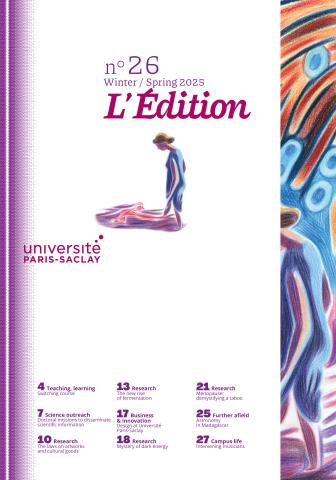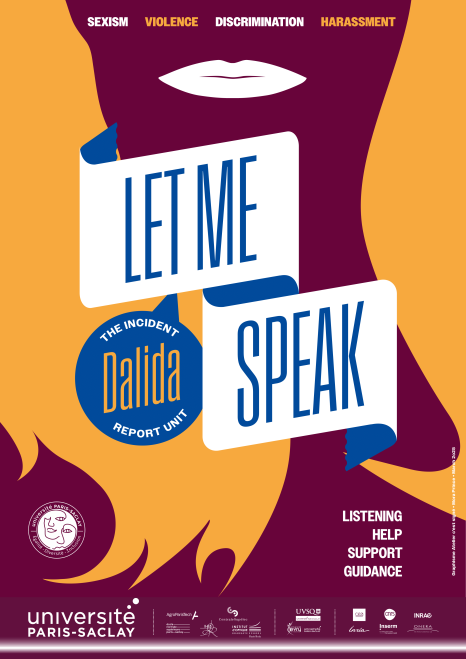
Dalida, a system for reporting violence, harassment and discrimination at the university
This article was originally published in L'Édition n°26.
In order to tackle sexist and sexual violence, harassment and all forms of discrimination, Université Paris-Saclay has decided to extend its system for reporting incidents. Now called Dalida for Dispositif d'Alerte Inclusion - Diversité Accueillant (Inclusion - welcoming diversity alert system), it is available for all university staff and the student community.
Since the start of the 2024 academic year, the "Harassment Unit" at Université Paris-Saclay, where incidents of sexist and sexual violence could be reported, has been replaced by Dalida, the university's Inclusion - welcoming diversity alert system (In French, Dispositif d'Alerte Inclusion - Diversité Accueillant). Besides the name change, the overhaul also marks a step forward for the system.
The change comes following the appointment of Clotilde Coron as Vice-President of Equality, Diversity and Inclusion at Université Paris-Saclay in 2024. In effect, this new vice-presidency role has gone hand in hand with an alignment of the university's various missions relating to equal opportunities, the inclusion of people with disabilities, and the fight against discrimination and sexist and sexual violence. As Clotilde Coron explains, bringing the various stakeholders together has made it possible to strengthen and extend the existing system to cover all forms of discrimination: "It appeared that in many cases, the situation was interwoven: for example, many cases of psychological harassment have a sexist or sexual dimension, and people with disabilities are unfortunately more often confronted with sexist and sexual violence. We therefore had to expand the Harassment Unit, so that no-one would be in two minds before reporting incidents of discrimination or sexual violence." Going forward, people will also be able to report psychological harassment and all forms of discrimination, whether based on gender, sexual orientation, religion, ethnic, social or cultural background, or disability. The choice of a new name for the system reflects this evolution. "Some victims told us that the term 'unit' was not very welcoming," explains Clotilde Coron.
A system that has already proven its worth
Extending the system to all forms of discrimination doesn't change the typical pathway taken by victims, which remains very similar to that in place since 2019. Élisabeth Cleme-Rousseau, the system's adviser on sexual harassment and violence, explains how it works: "Victims can contact us by e-mail or via an anonymous online form, by submitting a detailed report in which they specify the facts they wish to report or which have prompted them to take action, or simply by requesting an appointment. We generally respond in less than 24 hours, by offering in-person, telephone or videoconference support."
After that, the system's advisers record the facts, putting them in legal terms in a note sent to the university's Department of Legal and Institutional Affairs (DAJI), which will be responsible for the ultimate orientation of the case, demanding, for example, that the perpetrator be barred from entering the university site, or that the President refer the case to the disciplinary section. If the victim objects, the report will not be followed up, but will still be archived if the victim changes their mind, or in order to substantiate any further accusations against the same person.
"After they have reported an incident, we continue to support the victims, but we give them time, to avoid rushing them," continues Élisabeth Cleme-Rousseau. "We may contact the victim again, particularly in urgent cases, where describing the facts in legal terms requires crucial information. However, some victims may be deterred by the psychological and legal consequences of reporting an incident, and may not wish to pursue the matter further. We then respect their wishes, even if we strongly encourage them to file their complaint."
Professional advisers
The evolution of the system is also reflected in its more professional approach. According to Élisabeth Cleme-Rousseau, a lawyer by profession, the success of the system also depends on the trust that victims place in it: "It is important for the victim to confide in a trained adviser who can listen and reassure them, but is also able to tell them the truth, even if it's hard to hear, by making the law easier to understand." Victims are then referred to internal or external support services, such as the university's Student Health Services (SSE) or the Maison des Femmes (Women House).
In addition to the advisory service, the aim is to remind people of the university's role in preventing and reporting all forms of discrimination. "The idea is to reiterate that the 'zero tolerance' that applied to sexist and sexual violence applies to all other forms of discrimination," stresses Clotilde Coron. "However, this system is not the be-all and end-all of the university's equality, diversity and inclusion policy. The prevention aspect is crucial. Gender equality, the inclusion of people with disabilities, and the fight against racism, anti-Semitism and LGBT+phobia must also be visible as subjects in their own right."
While the system is mainly open to students, it is also open to members of the administrative and teaching staff at Université Paris-Saclay, as well as to witnesses of incidents. Since the system was extended at the start of the 2024 academic year, 35 reports have been made by victims, witnesses or student associations. Half of these related to sexist and sexual violence (SSV), which affect female students and PhD students in particular.
Learn more :
- on the Dalida system: https://www.universite-paris-saclay.fr/dispositif-de-signalement-dalida
- on the sexual and gender-based violence policy at Université Paris-Saclay: https://www.universite-paris-saclay.fr/en/about/sexual-and-gender-based-violence-policy

This article was originally published in L'Édition n°26.
Find out more about the journal in digital version here.
For more articles and topics, subscribe to L'Édition and receive future issues:
